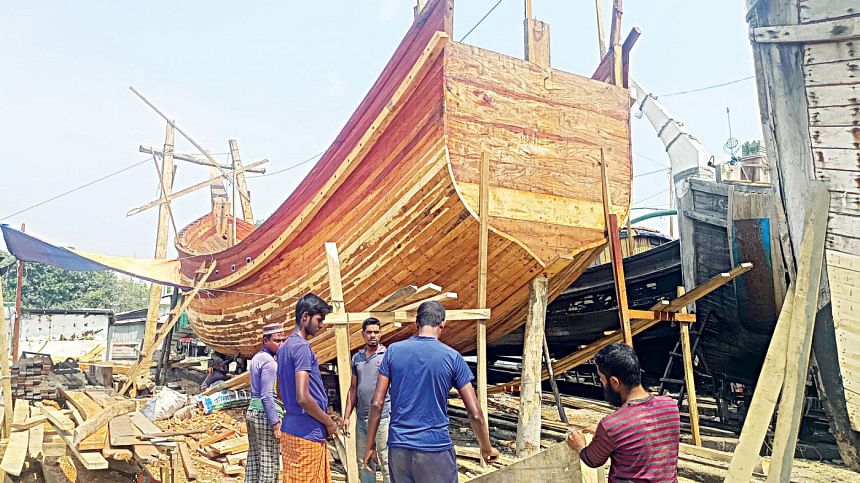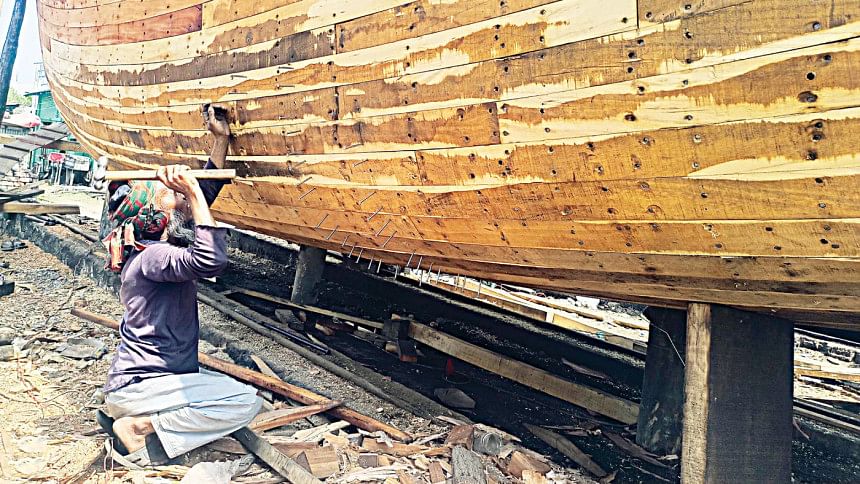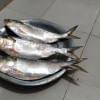Wooden trawler industry on the wane

The once vibrant wooden trawler industry in Bangladesh is losing its sheen as the use of these vessels has gradually declined over the years, according to manufacturers.
More than 2,000 wooden trawlers would engage in sea fishing off the coast of Patuakhali just 15 years ago but now, their numbers have thinned to about 250 in face of various adversities.
The demand for new vessels has decreased as less people are interested in sea fishing due to a number of bans each year, the threat of being attacked by pirates, labour shortages and higher fuel costs.
Fishers and traders in the district say hundreds of wooden trawlers were built each year before Cyclone Sidr hit in 2007. At the time, thousands of carpenters across Kalapara upazila and Rangabali upazila earned a living from the industry.
But now, the demand for wooden trawlers has fallen to such an extent that only three or four new vessels are made each year.
Jasim Uddin, head craftsman of the wooden trawler industry in Kalapara's Mahipur area, said he has been making the vessels since 1995.
Built out of good quality sapwood, mahogany and chambal wood, these trawlers take about three months to make at a cost of around Tk 40 lakh.
Each trawler, which ranges between 40 and 55 feet in length, can be used for about 10 years.

Before Cyclone Sidr, Uddin would make three or four trawlers each year, earning him as much as Tk 4 lakh per vessel.
Shahjahan, a craftsman of the Alipur area, said around 1,000 people were working in the industry just 15 years ago. However, many of these workers have since become unemployed due to the lack of work.
Now, just 100 to 150 people are living off the profession with much difficulty, he added.
Yusuf Fakir of Nizampur village is the only local craftsmen now to build new wooden trawler.
Fakir, who worked as a labourer on fishing trawlers since his childhood, had eventually decided to start making trawlers seeing as it was all he knew.
"I am still in this profession but it is not as profitable as before," he said.
Fakir went on to say that the government imposes numerous fishing bans each year.
Overall sea fishing is off limits for 65 days from May 20 to July 23 while Hilsa fishing is banned for 22 days from October 7 to 28 and Jatka Hilsa is conserved for eight months from November 1 to June 30.
"So, we are unable to fish for most of the year," he said.
Additionally, the seas are still plagued by pirates so even when fishers sail out, they are often attacked and looted for their catch, fuel, food and other goods.
Considering such losses, many people are leaving the job in search of work elsewhere. As a result, the demand for wooden trawlers has dropped, Fakir added.
Yusuf Khan, a resident of the same area, said sea fishing was his ancestral profession. Following his father's death, Khan took over the family business in the year 2000. Having started with just two wooden trawlers, Khan went on to own a total of nine vessels within the next 10 years.
However, he started facing steep losses due to a surge in piracy with some fishers even being kidnapped and ransomed. Ultimately, Khan was forced to sell his vessels and leave the profession.
Other former fishers in the area, such as Zainal Majhi, Malek Howladar and Babul Majhi, echoed the same.
With this backdrop, Ansar Uddin Mollah, president of the Alipur Fishing Trawler Owners Association, said craftsmen are not making new trawlers for the lack of buyers.
Fazlur Rahman Gazi, president of the Mahipur Fish Market Owners Association, said many people have left the profession as profits are not adequate.
When the 65-day ban is in effect, trawlers from neighbouring countries invade the waters and take away fish. So, some 5,000 fishers have left the profession in the last 10 years due to dwindling profits.
As a result, there are no more people to invest in making new trawlers, he added.

 For all latest news, follow The Daily Star's Google News channel.
For all latest news, follow The Daily Star's Google News channel. 







Comments